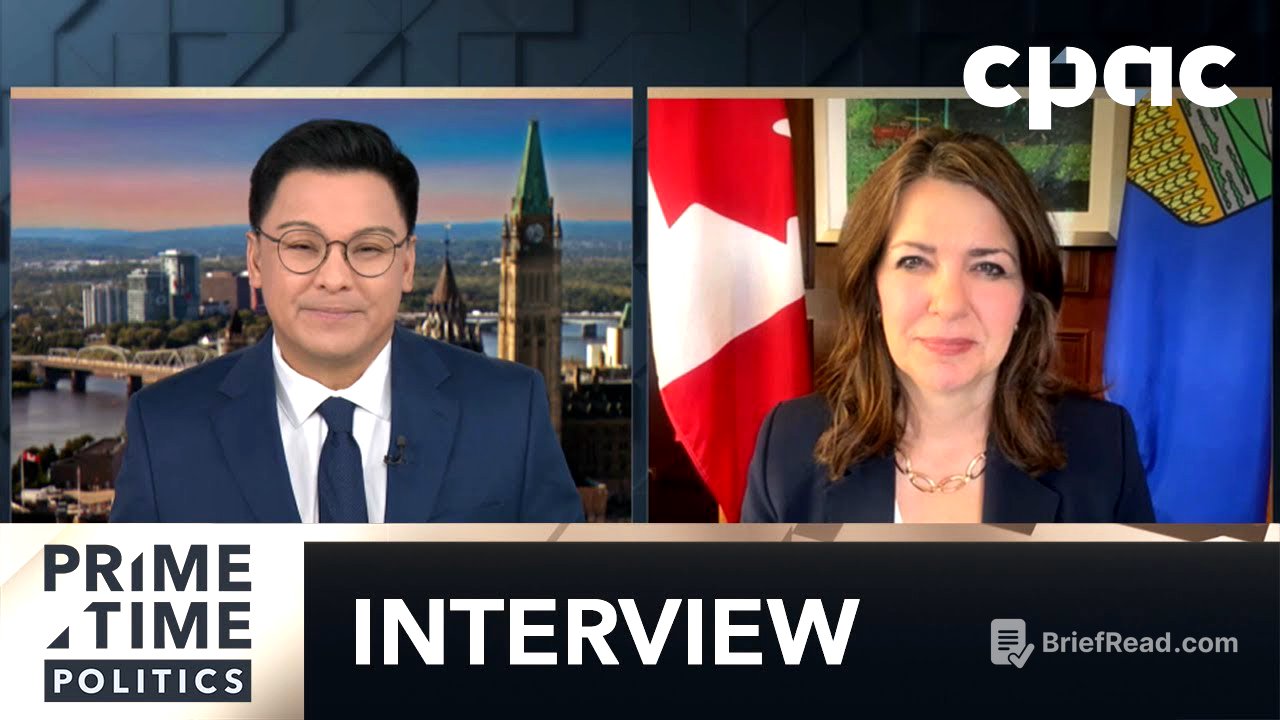TLDR;
Alberta Premier Danielle Smith discusses the potential impact of the incoming Trump administration on Canada-US relations, particularly regarding trade and energy. She expresses concerns about the potential 25% tariff on Canadian goods and the negative impact it would have on the Alberta economy. Smith emphasizes the importance of addressing the issues that are causing tension between the two countries, including illegal immigration, fentanyl trafficking, and Canada's NATO defense spending. She also criticizes the federal government's proposed emissions cap on the oil and gas industry, arguing that it would harm Alberta's economy and undermine Canada's ability to provide energy security to the US. Smith calls for a "Team Canada" approach to address these issues and advocates for a formal first ministers' conference to discuss the challenges of the new administration.
- The incoming Trump administration is likely to impose a 25% tariff on Canadian goods, which would have a devastating impact on the Alberta economy.
- The federal government's proposed emissions cap on the oil and gas industry is harmful to Alberta's economy and undermines Canada's ability to provide energy security to the US.
- A formal first ministers' conference is needed to address the challenges of the new administration and ensure a "Team Canada" approach.
Concerns About Illegal Drugs and Migrants [0:21]
Premier Smith acknowledges the concerns of the incoming US president regarding illegal drugs and migrants entering the US from Canada. She highlights the serious opioid and fentanyl crisis in Alberta, with drugs flowing in from British Columbia and the US. She also points out that Canada's open border policy has led to a significant increase in illegal migrants using Canada as a staging area to enter the US. Smith emphasizes the need to address these issues to improve relations with the US and facilitate trade discussions.
The 25% Tariff Threat [1:38]
Premier Smith believes the 25% tariff threat from the incoming US president is a serious concern and not just a negotiating tactic. She outlines the president's frustrations with Canada, including its trade practices, immigration policies, fentanyl crisis, and failure to meet NATO defense spending targets. Smith argues that addressing these issues is crucial for maintaining a positive trade relationship with the US. She also highlights the devastating impact the tariff would have on the Alberta economy, particularly on oil and gas, agriculture, forestry, and manufacturing sectors.
The Emissions Cap and Energy Security [4:07]
Premier Smith supports Pierre Poilievre's stance on the federal government's proposed emissions cap on the oil and gas industry. She argues that the cap is too aggressive and would lead to significant production losses, ultimately harming Alberta's economy and undermining Canada's ability to provide energy security to the US. Smith believes that removing the emissions cap would demonstrate good faith and help Canada forge a working relationship with the incoming Trump administration. She also points out that the president's desire for lower gasoline and diesel prices would be hindered by the 25% tariff on oil and natural gas.
The Need for a Team Canada Approach [5:31]
Premier Smith emphasizes the importance of a "Team Canada" approach to address the issues causing tension with the US. She believes that the federal government needs to take the Trump administration's concerns seriously, including border security, fentanyl trafficking, illegal migration, and NATO defense spending. She also highlights the importance of defending Alberta's interests in the oil and gas sector, which is a major contributor to the Canadian economy and a key supplier to the US. Smith believes that the federal government should prioritize these issues and work collaboratively with the provinces to find solutions.
The Importance of a First Ministers' Conference [7:23]
Premier Smith advocates for a formal first ministers' conference to discuss the challenges of the new US administration and ensure a coordinated response from Canada. She argues that the federal government has neglected its role in strategic defense and infrastructure, and that the provinces have been calling for more consultation on these issues. Smith believes that a formal conference would provide a platform for the provinces to voice their concerns and work collaboratively with the federal government to address the challenges ahead. She also expresses disappointment that the Prime Minister has not called for such a meeting sooner.









